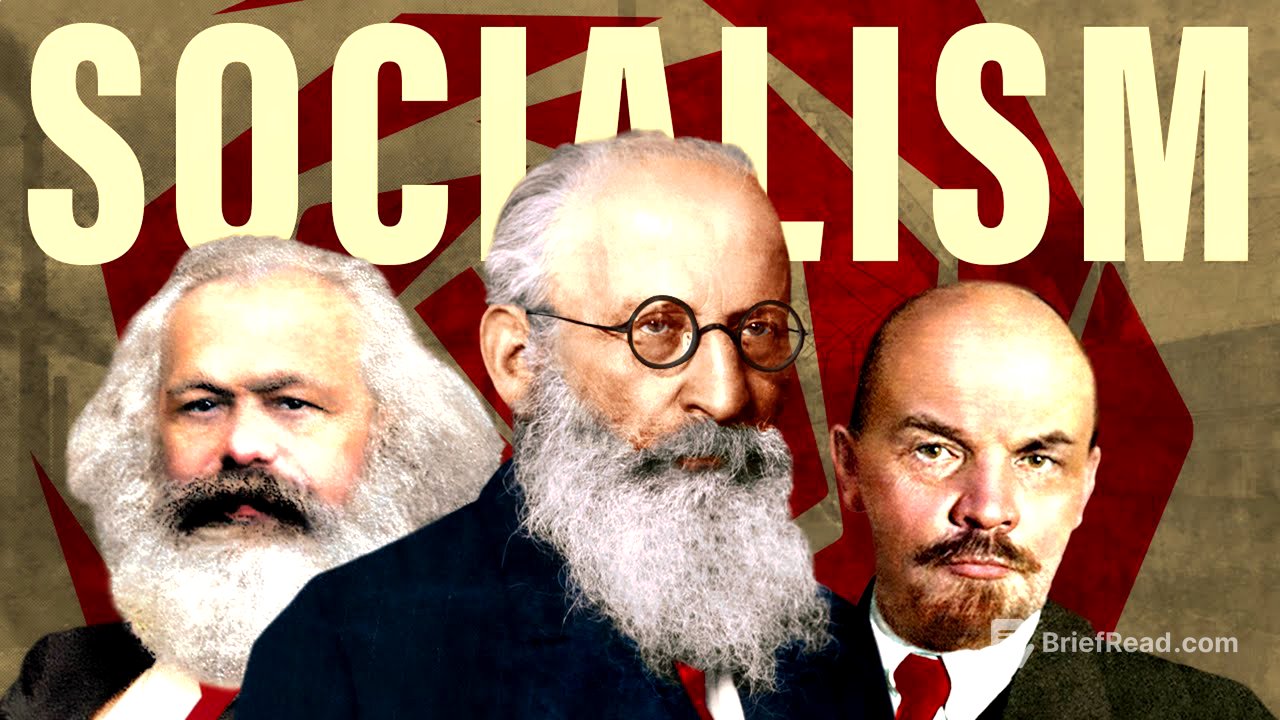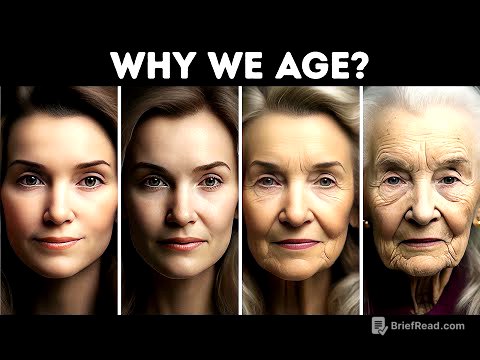TLDR;
This video provides a comprehensive overview of socialism, tracing its historical development and evolution. It begins by addressing the challenges in defining socialism due to its varied interpretations and historical context. The video then explores the origins of socialist thought as a reaction to liberalism and the Industrial Revolution, highlighting key figures and their contributions. It further examines the emergence of Karl Marx and his profound impact on socialist ideology, including his theories on class struggle and communism. The video also discusses the revisionist movement led by Eduard Bernstein, which challenged core tenets of Marxism, and the rise of Vladimir Lenin, whose adaptation of Marxism led to the development of Marxist-Leninist states. Finally, it examines democratic socialism and its emphasis on gradual reforms and social welfare within a liberal democratic framework.
- Socialism emerged as a reaction to liberalism and the Industrial Revolution.
- Karl Marx significantly shaped socialist ideology with his theories on class struggle and communism.
- Vladimir Lenin adapted Marxism, leading to the development of Marxist-Leninist states.
- Democratic socialism emphasizes gradual reforms and social welfare within a liberal democratic framework.
Intro [0:00]
The video introduces the complex and often polarizing topic of socialism. It acknowledges the varying perspectives on socialism, with some viewing it as a path to freedom and others as a path to tyranny. The video aims to provide an objective overview of socialism by exploring its historical development, key ideas, and different interpretations. It addresses the difficulty in defining socialism due to its evolving nature and the broad range of ideas associated with it. The approach taken will be chronological, tracing the origins and evolution of socialist thought to understand its current state.
An Overview [1:23]
Socialism emerged as a reaction against liberalism, particularly in response to the Industrial Revolution. Liberalism, emphasizing individual freedom and rights, laid the groundwork for capitalism, which socialists critique for its inherent hierarchies and economic inequalities. Socialists are concerned with concentrations of economic power, advocating for checks and balances against the wealth held by the rich over the poor. The core ethic of socialism is equalitarianism, which can mean equal distribution, equal treatment, or the fundamental belief in the equal worth and moral status of all human beings. Socialists are motivated by a sense of injustice, focusing on the circumstances of the worst-off and arguing that their conditions are often unnecessary and unfair.
Early Socialism [3:48]
Early socialist thinkers like Saint-Simon, Charles Fourier, and Robert Owen shared a sense of the inadequacy of unregulated capitalism. Saint-Simon advocated for a new Christianity focused on brotherhood and improving the conditions of the poorest, as well as rewarding those who contribute to the general welfare. Charles Fourier criticized the inefficiency of capitalist societies and proposed communal living and working arrangements to increase productivity and make work more enjoyable. Robert Owen believed that people are products of their environment and advocated for government-led education to form better character and promote good habits, reacting against the liberal idea that individual success or failure is solely one's own responsibility. While these figures predate the formal definition of socialism, their ideas laid the groundwork for later socialist thought.
Karl Marx & Communism [13:20]
Karl Marx synthesized various socialist ideas with German philosophy, particularly the philosophy of Georg Hegel, to create a comprehensive critique of capitalism. Influenced by Hegel's concept of historical progress, Marx grounded his theory in material conditions, arguing that the mode of production determines the social, political, and spiritual character of society. Unlike Adam Smith, who saw capitalism as fostering voluntary relationships, Marx viewed it as a system of class conflict and involuntary labor. Marx believed that history is driven by class struggles, with each stage of societal development marked by the victory of one class over another. He condemned capitalism for its exploitation of the working class, citing issues such as child labor, long hours, and dangerous conditions. Marx advocated for the abolition of private property and the establishment of a communist society, where class distinctions would be eliminated.
Communism, according to Marx, involves the abolition of private property related to industry, the elimination of class distinctions, and the establishment of a dictatorship of the proletariat. Marx envisioned a communist society where resources are publicly owned, wealth distinctions disappear, and individuals have the freedom to pursue various interests and activities. He believed that capitalism would inevitably collapse due to its internal contradictions, leading to a revolution by the working class. Marx's economic theory posits that business owners extract maximum profit from workers while paying them as little as possible, leading to the accumulation of wealth in fewer hands and the impoverishment of the masses. This would result in a revolutionary impulse and the eventual overthrow of capitalism.
Revisionism [29:12]
In the decades following Marx's death, capitalism appeared to be developing as he predicted, with class dynamics sharpening and Marxist parties gaining influence. However, contradictions to Marxism began to emerge in the late 19th century, as capitalism reformed and misery seemed to be shrinking. Eduard Bernstein, a highly regarded Marxist, challenged core tenets of Marxism, arguing that wealth was spreading across all classes and that the working class was not necessarily turning towards communism. Bernstein's views, known as revisionism, led to a split in socialism. He argued that improvements in society were unmistakable and that socialists were making progress by working democratically within the system. Bernstein reframed the goal of socialism, stating that "the movement is everything," which became a key mission statement for democratic socialism.
Vladimir Lenin [35:15]
Vladimir Lenin's contribution to socialism is characterized by the belief that revolution must happen and socialism must be implemented by any means necessary. Lenin was a devout Marxist who treated Marx's writing like scripture and was driven by a faith in his historical destiny to lead a Marxist revolution. He addressed the issue that communism was not spreading among the working class as Marx predicted by arguing that class consciousness must come from outside the working class, led by elites. This led to the concept of a vanguard of elites leading the revolution and holding power, a departure from Orthodox Marxism. Lenin's philosophy of revolution by any means necessary led to ideological and moral flexibility, with the Bolsheviks making alliances and seizing opportunities to gain power.
Lenin's approach also included the suppression of dissent within the party, with absolute conformity to socialism being enforced. This led to an authoritarian style of rule, with a one-party state, propaganda, censorship, and mass imprisonment of political opposition. Marxist-Leninist states also typically take steps to reduce socioeconomic hierarchies and provide welfare services. Economically, they tend to be experimental, abolishing certain types of property ownership and nationalizing industries. Despite not fully implementing communism, these states are called communist due to their self-identification and inspiration from communism.
Democratic Socialism [42:47]
In the years following World War II, people sought more moderate and stable solutions than those provided by authoritarians, leading to the mass adoption of liberal democracy. Socialists who were content to work within this system were known as democratic socialists, and their influence led to the spread of socialist ideas throughout Europe. Democratic socialists believed that government intervention to control inequality would lead to a happier and more stable society. The views of liberals and socialists began to blur, with liberals supporting welfare and regulated capitalism, and socialists accepting capitalism and some income inequality. Democratic socialism is characterized by gradual reforms and solving problems through piecemeal measures, rather than having an end goal of complete socialism.
Democratic socialists moved away from central planning and government ownership of the means of production, as experiments with these policies in the 20th century did not work out as well as hoped. The British Labour Party and Swedish Social Democratic Party became prominent examples of democratic socialism, focusing on diagnosing problems and solving them through reforms. The Swedish Social Democratic Party distinguished itself by toning down ideas of class conflict and instead pitching a kind of universal socialism, representing the people as a whole. Democratic socialists generally do not want the government to own the means of production or direct the economy, and they see themselves as representing people's interests more broadly.
Conclusion [47:01]
The video concludes by summarizing the main currents of socialism covered: Marxism, Marxism-Leninism, and Democratic Socialism. It acknowledges the existence of other types of socialism, such as authoritarian socialists in South America and Africa, and syndicalism. The video defines socialism as a socioeconomic philosophy primarily concerned with shaping wealth institutions or economic activity according to various interpretations of equalitarianism. It argues that equalitarianism is the motivating principle that runs through the tradition, with collectivism being a common solution. The video suggests that the case for socialism rests on the idea that in a society where individuals are seen as ends in themselves, the gifted, ambitious, or lucky can exploit or dramatically outperform those who are less so, leading to lives marked with shame. Therefore, a better society should have protections in place to mitigate that.









